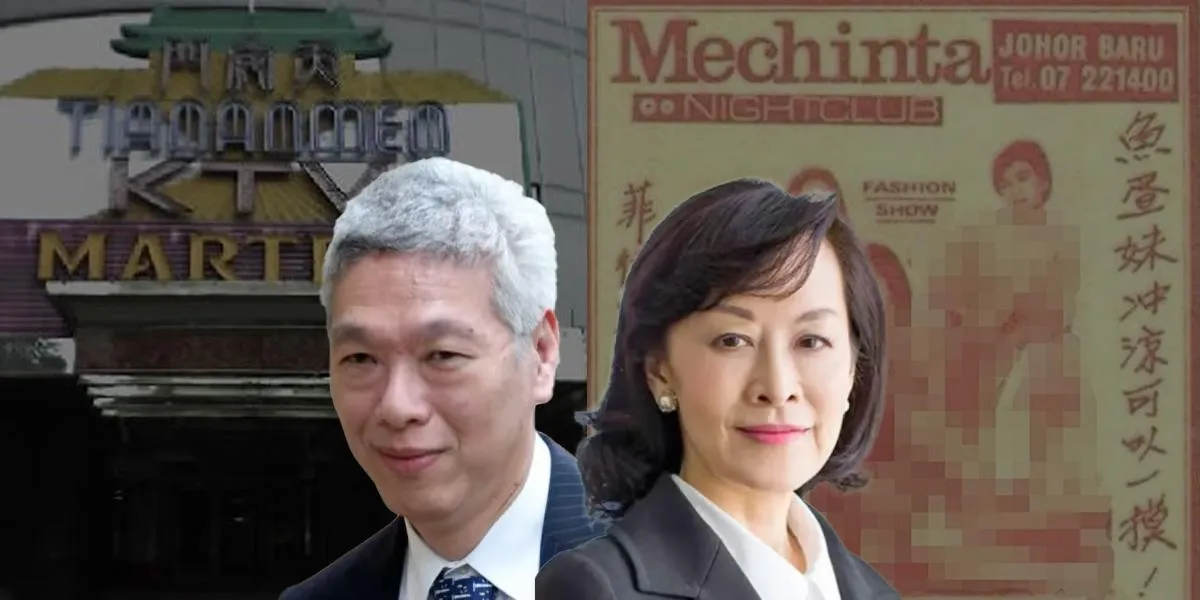专栏李显扬和林学芬夫妇一直觊觎总理的地位
林学芬早就认为李显扬应该要成为国家最高掌权者,甚至暗示这个位置最终可能由他们的儿子继承。

新加坡政坛向来被认为是任人唯贤,而不是根据关系或血缘。 然而,李显扬最近的举动表明了一种不同的方式:源于继承权、反叛心理和想建立自家皇朝的野心。 曾经是新加坡精英圈中安静人物的李显扬,近年来逐渐扮演起一个令人意想不到的异见者角色,让人不禁对他真正的意图和心理动机产生疑问。 许多十分了解李显扬公共生活的人,注意到一股暗流,涌动着他的不忿—,甚至可能是一丝遗憾,因为他从未有机会角逐总理一职。 多年来,他的举止偶尔反映出一种压抑但难以掩饰的矛盾感,似乎对于自己所错失的机会感到不满。 熟悉他经历的资深媒体人士观察到:“李显扬的举动显示,他认为自己与他的哥哥能力相当,且对被排除在外持续不满。”若事实真的如此,那李显扬的冷板凳代表的可能不仅仅是兄弟间的竞争,更暗示着一个延续数十年,“既生瑜,何生亮”而壮志难酬的心理挣扎。 ##李显扬一直活在哥哥的阴影下 1979年从剑桥大学毕业后,李显扬加入了军队;他在1989年休假一年,从斯坦福大学获得管理科学硕士学位。李显扬在军队一共服务了15年,是一名准将,曾担任联合行动与参谋职务。1994年,他空降进入新加坡电信成为总裁。 在李光耀的回忆录《从第三世界到第一世界:新加坡故事》中,这位资深政治家赞扬了长子李显龙的成就,但在谈及幼子李显扬时似乎有所保留。 书中提及李家的九页内容中,有五页深入探讨了李显龙卓越的学术成就、在新加坡军队、政治和政府部门的迅速晋升、以及他在困难时期对稳定经济的指导。“李显龙一直对国家和政府正在发生的事情感兴趣,”李光耀作为父亲自豪地写道。他写了许多李显龙的轶事——关于李显龙学习马来语、如何养育一位白化儿子,和与癌症抗争的故事——提供了李光耀对长子生活和性格的深刻个人观察。 相比之下,对李显扬的描述则很简略。 他被简短地描述为剑桥一等生,被提到“有潜力成为公务员首长,(但)更喜欢私人企业的挑战。”当批评者指责李显扬是由于裙带关系,才被任命为新电信总裁,李光耀为此辩护,称这是基于李显扬自己的能力:“如果他是因为与我的关系而被任命的,那对他本人,和对我所建立的任人唯贤制度来说都是一场灾难。与他共事的官员和他的同僚们都清楚这一点。”“基金经理们也清楚这一点。新电信的股价并未走弱。”##李光耀或多或少夸大了李显扬的能力 然而,许多新加坡人可能发现李光耀的话与李显扬在新加坡电信的记录完全相悖。 2001年,他对澳洲电讯提出170亿新元收购时,投资者信心已经动摇,4月份股票下跌了22 %。尽管全球电信业迅猛发展,但他六年任期内新加坡电信的表现基本保持停滞——这是新加坡基金经理们争论的焦点,也与他哥哥李显龙备受赞誉的崛起形成了鲜明对比。 根据《经济学人》一[项对5069家全球公司的研究](https://www.economist.com/business/2001/11/29/marked-by-the-market),在李显扬领导下,新电信在2001年毁掉最多财富的排行榜上,竟排第18。 李显扬于2007年从新电信辞职,引发了许多猜测,传闻称他与珀斯的新电信澳都斯的员工之间的行为,导致婚姻出现问题。然而这未得到证实。 李显扬在当年辞职时的新闻发布会上表示,他想要辞职,没有特定的理由,“真的很难找到一个理由。在某个时间点,你会觉得你在某个角色上已经有一段时间了,你会想寻求改变,而12年对于任何首席执行官来说都是很长的任期。”有关李显扬的新工作的传言 曾有传言称他可能被任命为中级大使,但随后被认为不太可能,一位了解李显扬的电信分析师曾说:“他不喜欢旅行,喜欢自己熟悉的地方”。有猜测说他可能进入新加坡报业控股的董事会,或者回到军队,又或者像他那有更高成就的哥哥和父亲一样,进入政界。 但政治后来也被排除在外。李显扬当时说:“我多次说过,我不认为政治是适合我的事情。我对从事政治没有太大兴趣。”一位前新电信高管认为这一声明显得很随便,因为李显扬和林学芬早就认为李显扬命中注定应成为总理,甚至暗示这个野心最终可能由他们的儿子继承。“你可以感觉到他们之间有一种共同的信念:总理的职位对他们来说,就是他们家族应得的。”尽管声称对政治不感兴趣,[李显扬在2020年加入了新加坡前进党PSP](https://www.straitstimes.com/politics/ge2020-lee-hsien-yang-joins-tan-cheng-bocks-progress-singapore-party)。,网民们迅速指责李显扬是为了报复他哥哥而参政,因为当时两人已经因为李光耀位于欧思礼路的故居陷入长期纷争。 在2024年接受《金融时报》[的独家采访中](https://www.ft.com/content/8a3562c9-0f8f-4451-b190-a52b487d25e3),李显扬和林学芬表明他们担心李显龙会利用国家机制阻碍他们家族分支进入政治,特别是可能阻挡他们的儿子李绳武未来的政治抱负。 ##关于自大的心理、权力和继承权的思考 无论李显扬的行为是因为长年的不忿,还是基于想建立皇朝的幻想,[他的雄心似乎得到了他家人的支持](https://fathership.co/lee-hsien-yang-unhappy-that-li-shengwu-may-not-one-day-rise-to-the-position-of-prime-minister/)。他的儿子李绳武被认为是李显扬夫妻共同愿望的体现,要实现李显扬曾为自己设想的未来。 李显扬的公众形象曾是一个正经的商人,但那些了解其家庭的人,早就注意到一种复杂的挫折感、野心,和他们那种自认为被剥夺了继承权的想法。 李显扬不断演变的角色引发了许多疑问。他的故事几乎像莎士比亚的悲剧,又或是三国里的政治任务一样,未竟的雄心转化为个人反叛,现在则希望能有自己的儿子来完成这个追求。 或许最令新加坡人困惑的,是他们将领导地位视为家族继承的观念。 尽管存在少量的任人唯亲,在新加坡这样一个深深植根于任人唯贤理念的社会中,这种皇朝式的看法似乎跟不上时代,甚至接近脱离现实的幻想。 随着李显扬不断挑起事端,他的动机仍然笼罩在谜团之中,似乎是他尚未完成的个人旅程——对于继承权的反叛,抑或是为了争取继承权的反叛。

